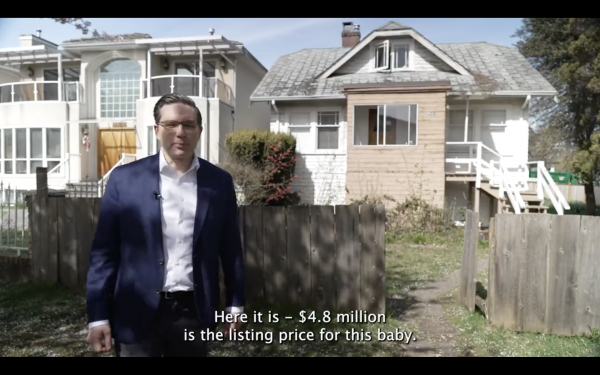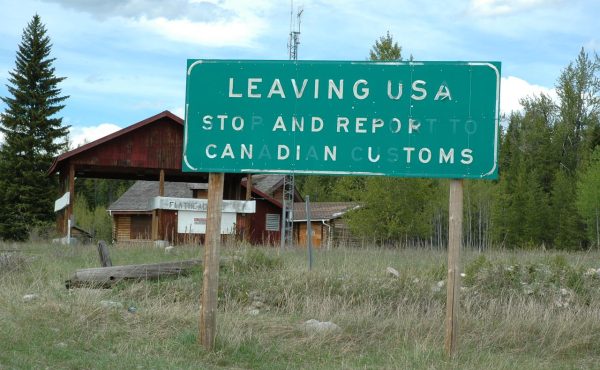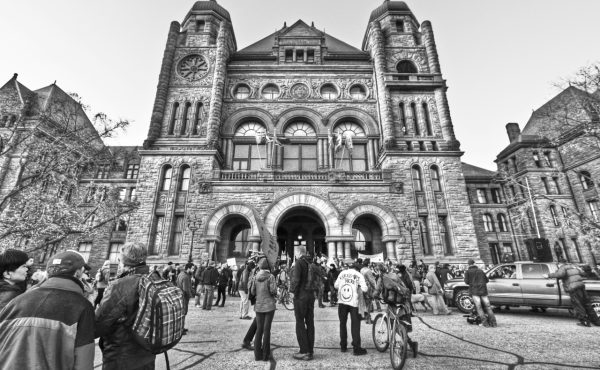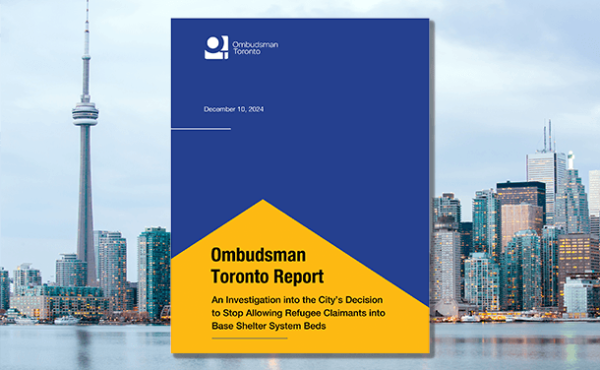Why do we have a housing crisis?
Let me count the ways: Low interest rates, restrictive zoning, permissive zoning, contractor shortages, building material costs, over-reliance on markets, under-investment in social housing, onerous building codes, condo laws, financialization, fees, bureaucratic delays, resident association obstructionism, blind bidding, five-figure realtor commissions, money laundering, urbanization, demographics, inequitable intergenerational wealth transfer, climate, the law of unintended consequences. Repeat the last one.
What’s more, anyone who suggests the problem is uniquely Canadian, or can be solved with some kind of policy pixie dust, is selling, to shift metaphors, snake oil.
Which brings me quickly to Tory leadership candidate Pierre Poilievre’s tweeted video this week about Vancouver real estate prices and “big city gatekeepers” — a work of visual rhetoric so steeped in dissembling and illogic that I’m loath to let it pass as merely another of his social media, uh, emissions about “freedom.”
According to Poilievre, there are two easy-peasy explanations for why the “working class” can’t afford to buy homes, such as the $4.89 million tear-down he pimps out in the video: first, the Bank of Canada’s quantitative easing policy — he doesn’t use the term because, well, you know, common folk — that has flooded the economy with cheap money, triggering inflation; second, that “local gatekeepers” — i.e., municipalities — impose $644,000 of “governmental costs” for “every single unit of housing in Vancouver.”
Solution: he’d force the Bank of Canada to change its monetary policies (Correction: he couldn’t do this unilaterally) and require municipalities to “speed up building permits and reduce the governmental costs of building things.” “My message to city hall here in Vancouver is, remove the gatekeepers, stop blocking the poor, the working class and our immigrants from the privilege of owning a home here in this country. It used to be a right and it should be again if you’re prepared to work hard.”
Mission: accomplished!
Full disclosure: I went back and forth about rebutting the claims in his video, because it only gives Poilievre more oxygen. But there is political rhetoric and then there’s outright lying, and it seems to me that anyone aspiring to run for high elected office has some obligation to stay on the sunny side of the line separating fact from fiction.
Just to get these points out of the way, no one ever had a “right” to own a home in Canada, and property rights were excluded from the 1982 Charter of Rights and Freedoms. As well, last I checked, the federal government doesn’t have the ability to direct municipal planning, unless Poilievre is proposing to repeal s. 91/92 of the BNA Act (he’s not, of course).
Poilievre cites a C.D. Howe study on development fees in his claim about $644,000 in “governmental costs.” This report came up with that number for the City of Vancouver, but qualified the point by noting that elsewhere in Metro Vancouver, as well as most other big cities, including Toronto, the figure (i.e., the cost of development charges, delays, fees, etc.) is less than third the amount he cites. In Vancouver, as the C.D. Howe itself acknowledged this month, land prices — elevated because the city is so highly constrained geographically — account for a significant portion of those excess costs — again, another inconvenient detail Poilievre doesn’t bother acknowledging.
Beyond these higher-level counterfactuals, it’s surely worth pointing out that Poilievre’s example is not at all what it seems. The house he shows, and carefully frames in his video, is actually on a double-width lot — 66-feet, but you don’t see most of that frontage. Zillow shows that prices in the immediate few blocks are in the $1.5m-$2.5 million range, hardly affordable, but considerably less because, well, they’re standard sized properties.
Poilievre points out that on the lot next door an older house has been recently replaced by six units — what he describes as “a multi-unit housing situation” (emphasis added). He back-of-the-envelopes the cost of a similar redevelopment for his $4.89 million teardown and concludes that each of those units would go for about $1 million. “Who can afford payments on a $950,000 mortgage, forget property taxes and utilities?”
This, of course, is the $64,000 question, and it’s the right question to ask. But here again, Poilievre is blowing smoke. He fails to acknowledge the billions of dollars in dirty money that flowed into the Vancouver housing market for the past decade or more, jacking up prices overall by 5% (at least), according to a provincial task force on money laundering.
Nor does he mention that the teardown sits on land that was rezoned last year by the City of Vancouver to allow for this kind of low-rise intensification — six homes where one stood before. The new designation — RT-11 — “allows a variety of housing options by encouraging development of multiple small houses and duplexes on larger lots and assembled sites,” according to city documents. It is, in other words, more permissive zoning that in turn supports greater affordability than, say, a single-family McMansion. Again, he’s not interested in confusing his audience with those kinds of details.
Presumably, Poilievre doesn’t care for this kind of housing “situation”; indeed, his repeated invocation of the misty-eyed era of the single-family “working class” home suggests (unsurprisingly) that he’s more interested in sprawl, with all its considerable infrastructure costs. His vision of sprawl, of course, edits out all the pesky fees and development charges which pay for luxuries like sewers and roads. But whatever. Freedom is its own reward.
To be clear: I don’t expect a politician as brashly dishonest as Poilievre to produce anything even vaguely nuanced, much less accurate. Indeed, there’s ample evidence that he’s willing to say anything to win the Tory beauty contest.
But the message track, targeted as it obviously is to millennials and lower-income voters, is that the solution to the housing crisis is not only obvious, but subject to the will of the central government, which is complete nonsense. He’s selling voters a bill of goods.
It’s also worth saying that Poilievre would never countenance policy measures that might actually dent the affordability crisis, like taxing the capital gains on principal residences and using those funds to build housing; making massive investments in co-op housing; clamping down on the real estate industry’s conflicts of interest; or bringing back the somewhat dubious tax credits that financed so many affordable rental apartment buildings in the 1960s and 1970s.
The point is that Poilievre’s suspect claims about kick-starting the construction of housing priced for ordinary folk are no more credible than his contention — debunked by every economist this side of Jupiter — that bitcoin can be used as a hedge against inflation. The millions of Canadians who struggle with this reality every single day — Pierre and his family not among them — deserve so much better.







16 comments
I was interested in learning more on this topic but your clear distaste of Poilievre dominated the piece. There are, after all, lots people who vote for the Tories, but these people are also interested in learning more about their selected candidates political platforms and deciding themselves whether or not they are flawed. Pieces written like this only serve as a wink to ‘your side’ and do nothing to actually help educate voters and let them come to their own conclusions.
Might I suggest next time a more neutral laying out of the situation followed by an even handed critique of the politician’s platform. For example, you say his claims about bitcoin are ‘debunked by every economist this side of Jupiter’ but do not reference a single one of these economists, nor provide even a short summary of the debunking. Your personal distaste for the Tory candidate is not actually an argument in and of itself. Canadian media needs to stop contributing to this asinine political tribalism that is starting to grow stronger in our country. Do better.
Ugh, “the distance for the Tory candidate”.
No, this is about Poilievre specifically. Arguing otherwise moots all other criticism you throw the author’s way.
John, you completely missed the point of PP’s video. This brash dismissal of the issues he presents – and the general tone of mockery and talking-down to anyone who may agree with him, is the exact reason PP is as popular as he is. The current situation – whatever the causes – is not working for people. Do better.
“the general tone of mockery and talking-down to anyone who may agree with him, is the exact reason PP is as popular as he is.”
So, because his policies are being thoroughly critiqued by the public and media, just like every political candidate, that makes him popular? You do better, specifically when it comes to using logic. Dammit, Lorinc has been one of the best columnists talking about housing and how to help fix the situation.
John Lorinc is here to provide his fact-based opinion. Damning him for doing exactly this serves no one with honourable intentions. He’s under no obligation to be “neutral” if honesty and truth demand otherwise. He pointed out facts that Pollievre wasn’t going to bother with, and if you dislike that, show us facts to counter Lorinc’s argument.
I’m pretty sure PP is an Air Farce character.
Poilievre’s interest in this house is as a loss leader. That’s when you advertise something that people want — or in his case sing a song they like — to get them in the store. You watch them bite and smile a bit, and then load the customers down with your junk, playing elevator music quite loud so they don’t notice the bill.
Well John it would appear you are smarting than anyone here in Canada, or in fact all of North America. It has been document well about how red tap and fees and taxes make building affordable housing out of reach across North America. So please enlighten us with your so called solutions.
just another one sided journalist pint of view. Classic modern day journalist grand standing their point if views instead of reports the news. Not worth you time to read this.
The negative comments are clearly people who only read the headline, did not read the article, or got past first paragraph. Those like “Chris” and “Don Simpson” prove it by asking questions that were CLEARLY answered in the column. Pathetic.
This is an excellent article Mr Lorinc. I am mystified at some of the commentators who call you out for labelling Pierre Poilievre a liar. Your well researched, evidence-based analysis allows for no other conclusion. I have worked closely with politicians across parties, across jurisdictions across Canada and internationally for over 40 years. I chaired a federal board during the Mulroney tenure, reporting directly to three federal PC cabinet ministers for eight years. I have never encountered a politician like Mr Poilievre who constantly lies, misdirects, misinforms and manipulates information for self-serving reasons.
A case in point: I have worked on GHG assessment and reduction management strategies for over 40 years. From 2004-11 the CPC including Mr. Poilievre supported carbon pricing initiatives for reducing GHGs. But in 2012 Mr Poilievre began his incessant mantra that the federal carbon tax was nothing more than a job killing Liberal tax scam. Prior to the 2019 election I wrote a detailed analysis of the regulatory options for reducing GHGs including an exhaustive annotated bibliography identifying the near universal agreement by economists that carbon pricing is the most cost-effective tool for reducing GHGs with the least amount of government interference. I had and still have one simple request for Mr. Poilievre. Provide a list of references he relies on to justify his opinion that the carbon tax (including the rebate he never mentions), is a scam.
Throughout my career as a criminal, constitutional and environmental law consultant and law professor I have worked on Indigenous issues, gun control, drug addiction and jurisdictional issues. I have never felt compelled to challenge a politician so aggressively prior to Mr. Poilievre’s tenure. All of my correspondence is carefully researched and documented and my request always remains the same: what sources do you use for the position you are taking. I have never ever received a satisfactory answer. As I have said many times I am happy to share my correspondence and Mr. Poilievre’s responses with anyone who is interested. The thought of Mr. Poilievre as our Prime Minister frightens me. Please keep up your excellent work and do not let the deniers deter you. Thank you.
What is wrong with some of these commenters? This is an opinion column. That’s his job to state his god damn opinion!
The only reason these PP supporting trolls can only yell BIAS at any member of the media is because they can’t even identify the difference between a news report and an opinion column.
I can afford to live in Toronto only because I own (pretty much) a house, that I purchased in 2006. Since then, and certainly for some years, the house “made” more money than I did.
That’s a disturbing and very problematic situation. So it’s not surprising that people (who weren’t lucky enough to be in the housing market in 2006, without needing to be millionaires) are desperate for solutions to the problem.
Of course Poilievere’s (and pretty much Doug Ford’s) “solutions” to the problem are as realistic and as useful as offering everyone a rainbow-coloured unicorn that poops gold, so presto! you can use the gold poop as down-payment and mortgage payment.
I assume that it will be “liberal elites” that will be blamed for the non-appearance of the rainbow-coloured unicorns that poop gold. Oh well.
The interesting thing is how many properties in Toronto, right now, are vacant. I spend a good part of a working day in neighbourhoods all over the city, and it’s pretty obvious where no one is home. This includes cheap crappy townhomes (what would be student rental housing if COVID hadn’t closed so many post-secondary institutions), fifties and sixties bungalows (I presume the owners are typically elderly and in a care home, and the property has not been sold–and might not be until the estate sale), other houses that look like AirB-n-B specials (not much tourism these days), and gigantic luxury mansions waiting for their next multi-millionaire.
If you assume that property prices are going to go up by say 20% per year, and your property is worth a million bucks now, you would be in no hurry to sell because it will be worth two hundred thousand dollars more next year. You don’t need to deal with the hassle of tenants and collecting rent, you’re making money even as the property sits vacant.
SR complained that John Lorinc was biased & should have stayed neutral in his reporting. Lorinc does report the fact that Polievre lies constantly in his assertions about Vancouver real estate and he documents that. Seems balanced to me.
Lorinc reports Polievre’s “contention — debunked by every economist this side of Jupiter — that bitcoin can be used as a hedge against inflation.” This bothers SR because Loribc doesn’t document the views of economists. The debunking of Bitcoin as a hedge against inflation I’d in fact a commonplace, so ubiquitous it doesn’t likely need documenting in something as brief as a Comment. Bitcoin in fact tracks NASDAQ pretty closely (though with greater volatility).
Bitcoin failed completely as a hedge against inflation. So BTW does gold, which hasn’t worked as an inflation hedge since the mid-1970s.
It appears many Commenters have been bothered that Lorinc has focused on Polievre’s non-stop string of lies. He certainly appears to be trying to follow Trump’s example in how to practice politics. That these guys take exception to Lorinc pointing this out tells us more about them than it does about Polievre. Certainly more than it tells us about Lorinc.
One aspect of the high prices only hinted at is the snow-washing/laundering problem, which I’m sure is in play in Toronto, and has been. And yes, it seems quite logical to have an inflationary impact as if a dirty source gets to have a large amount cleaned up, easily, it’d be quite worth paying another 5, 10, or 15%, right? Two books, perhaps available at Book City, are the Kleptopia book by Tom Burgis based in London/FT but also Sam Cooper’s book Wilful Blindness documenting a lot of the Canadian/Vancouver Problem. Ontario is well-suited to avoiding knowing who owns what with the long use of numbered companies, and while the federal level is making some noises about change, oops, horses are well-bolted and once the money’s cleaned, it’s out there, $loshing around.
Also, there are many empty spaces/places around. Hope it pops soon,
And I’m sure the City Council will raise the property taxes aligned with housing inflation eh?
Thanks for a late comment, on an essential topic. The war in Ukraine has highlighted, in some areas, just how embedded some dirty money is in economies/places. This longer video on ‘Londongrad’ has footage of Kleptocracy author Burgis.
https://youtu.be/gyk12Wf_TeQ
As many of the recent buyers in the pandemic housing inflation period were ‘investors’, at times I wonder if the announcement by federal Liberals on starting to get around to cleaning up the inflows of $losh helped bring more of it in, from all parts of the world, not merely Russia.
And while at times the Conservatives have been helpful in denouncing the torquing of markets, and Mr. Polievre as well, if Mr. Ford is an example of what we’ll get, hmmm….